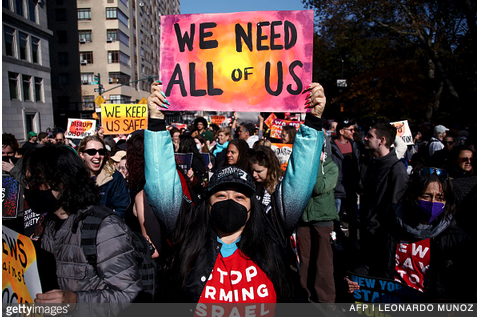(Originally Published by PBS.org, March 6th 2021)
On his first day in office, president Biden signed an executive order to stop construction of the Keystone XL pipeline. But now, many people in the Great Lakes region are asking the Administration to halt a different pipeline project they believe poses an even greater threat to indigenous communities and local waterways. And as NewsHour Weekend’s Ivette Feliciano reports, experts and climate advocates say it’s time to stop oil pipeline projects in the U.S. once and for all.
Read the Full Transcript
Hari Sreenivasan:
On his first day in office, President Biden signed executive orders aimed at aggressively tackling the climate crisis, including stopping construction of the Keystone XL Pipeline. But now, many people in the Great Lakes region are asking the administration to halt a different pipeline project they believe poses an even greater threat.
Thirty years ago this week, the Line 3 pipeline in northern Minnesota ruptured, spilling 1.7 million gallons of crude oil onto a frozen river near Grand Rapids, Minnesota. If the river had not been frozen, the oil could have seeped into the Mississippi River and contaminated drinking water for millions downstream.
Protests have been ongoing to stop construction rerouting a section of the Line 3 pipeline which could impact Indigenous communities and local waterways. And as NewsHour Weekend’s Ivette Feliciano reports, some say it is time to stop oil pipeline projects in the U.S. once and for all.
Ivette Feliciano:
Facing freezing temperatures in January, environmental and Indigenous activists in Minnesota protested an oil-pipeline project underway in the Great Lakes region by Canadian-owned energy company, Enbridge.
Protestor:
We’ve locked ourselves down inside this pipe which will become Line 3 pipeline. To stop them from welding this pipe together.
Ivette Feliciano:
They say the Line 3 pipeline is bad for the environment, and local communities, and that projects like these set the U.S. back in the transition away from burning fossil fuels.
Enbridge aims to replace an existing Line 3 pipeline that is corroding and operating at a reduced capacity. Mike Fernandez, is Senior Vice President at Enbridge.
Mike Fernandez:
It already exists. So it’s unlike the recent decision on the Keystone XL pipeline, which was a new pipeline.
Ivette Feliciano:
But, the replacement does involve building a new, 337-mile pipe along a different route in Minnesota, that will nearly double the amount of oil the current pipeline carries.
It crosses more than 200 water bodies, and 800 wetlands, to carry tar sands oil from Alberta, Canada, to Superior, Wisconsin.
Fernandez says the pipeline replacement provides many benefits, including more than 4,000 jobs during construction, and additional tax revenues to northern Minnesota in a slow economy.
Mike Fernandez:
It’s everything from transportation fuel to heating homes. It can be refined into plastics that are used for computers and television sets. And so right now, the economy very much depends on this. And I get people’s concerns. The reality is that pipelines are the most efficient and safest way, and most environmentally sound way, to transport this needed fuel.
Ivette Feliciano:
The project, first proposed in 2014, got its final permit approval last November from the U.S. Army Corps of Engineers. Replacement work began in December.
Since then, dozens of people have been arrested for protesting the project. That includes Winona LaDuke of Indigenous climate justice organization Honor the Earth, and member of the White Earth Band of Ojibwe in Minnesota.
Winona LaDuke:
You have women like myself. I’m a grandmother, you know, and we’re standing out there. I have six charges against me for this pipeline. And there’s a bunch of us that are facing charges for trying to be a water protector.
Ivette Feliciano:
She and others have been part of the seven-year fight opposing the project throughout the state and federal review processes.
Winona La Duke:
It is the largest tar sands pipeline in the world. This pipeline is the equivalent to 50 new coal-fired power plants. So, you know, if you’re trying to save the planet, this is not the way to do it.
Ivette Feliciano:
A report by climate justice organization 350.org, and a physicist at Macalester College in Minnesota, found the Line 3 expansion would increase the state’s existing annual greenhouse gas emissions.
Winona La Duke:
We don’t need any more oil pipelines. You know, it’s the end of the party, who wants to be holding the last fossil fuels pipeline?
Ivette Feliciano:
In its latest legal effort to stop Line 3, last December, Honor the Earth joined The White Earth and Red Lake Nations, and the Sierra Club, in filing a federal lawsuit against the U.S. Army Corps of Engineers. The lawsuit argues that the Army Corps didn’t adequately assess the potential for exacerbating climate change when it approved the permit, nor its impacts on Indigenous treaty land rights.
Ivette Feliciano:
Tara Houska is Couchiching First Nation Anishinaabe and the founder of the Indigenous-led Giniw Collective.
Tara Houska:
Treaties are in the U.S. Constitution as the supreme law of the land. It’s time to honor the treaties in a different way.
Ivette Feliciano:
She says the replacement pipeline opens up new areas of the state to potential spills that could pollute fragile waterways and other ecosystems in treaty territories.
Tara Houska:
We’ve got a president that maybe respects treaty rights and is calling himself a climate president. We need the action, not just the words.
Ivette Feliciano:
Beginning in 1979, the old Line 3 pipeline caused several oil spills along its route in the Great Lakes region, including the largest inland oil spill in American history in 1991, and a fireball explosion in 2007 that killed two people. As a result, in 2008, Enbridge cut Line 3’s operating capacity by nearly half.
Mike Fernandez says Enbridge understands the environmental concerns, which is exactly why a replacement project is underway.
Mike Fernandez:
It’s been six years of study and scientific review and technical review, and as a consequence, there are actually 320 route modifications that have been made. This is viewed as essentially a modernization project, to upgrade what’s there so that it is safer. So it does have less impact on the environment.
Ivette Feliciano:
Fernandez believes protestors don’t speak for everyone, as Enbridge employs native people who are working on the pipeline expansion, and at least one Ojibwe tribe has agreed not to oppose the project.
Mike Fernandez:
It’s like people are just against pipelines because they fear anything that’s fossil fuel. But this is something we are already dependent upon. When I see protesters, and we’ve had four administrative law reviews, and we’ve gone through all of this work with the U.S. Army Corps of Engineers and the Bureau of Indian Affairs. It’s a little bit like the election where we’ve gone through the entire process and people still want to not accept that legal process.
Ivette Feliciano:
But protestors in Minnesota say they don’t want modifications to the old infrastructure, they want oil pipelines like these to become obsolete.
Under Enbridge’s permit with Minnesota’s Public Utilities Commission, Enbridge must reimburse public safety agencies for expenses at work sites, especially costs for policing protests. Last November, a Minnesotan Sheriff’s office requested tens of thousands in reimbursements for additional riot gear and weapons. Winona LaDuke says that funding should be a red flag for anyone who supports the project.
Winona LaDuke:
I am not a criminal, I’m a water protector. At a certain point, someone has to ask what is right about a Canadian multinational financing the police force in your state to put in a pipeline with so much conflict?
Ivette Feliciano:
LaDuke says a trial date of March 23rd has been set for the federal lawsuit that seeks to halt the project, which is on track to be completed by the end of the year. Yet opponents hope President Biden will intervene before then. More than 200,000 people have signed a petition asking him to stop Line 3. In the meantime, La Duke says protests will continue.
Winona LaDuke:
Imagine if there are fifty or two hundred people facing cops and it’s ten below zero.You know what’s coming spring? And more people come, more water protectors will come. I guarantee you that.


